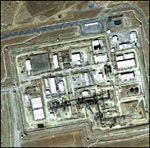 Reuters: Iran says nuclear issues are not even up for discussion when it meets major powers in Geneva on Monday, so chances of agreement are slim, though the first such talks in a year may yet lead to more substantial negotiations.
Reuters: Iran says nuclear issues are not even up for discussion when it meets major powers in Geneva on Monday, so chances of agreement are slim, though the first such talks in a year may yet lead to more substantial negotiations.
By Parisa Hafezi
 TEHRAN (Reuters) – Iran says nuclear issues are not even up for discussion when it meets major powers in Geneva on Monday, so chances of agreement are slim, though the first such talks in a year may yet lead to more substantial negotiations.
TEHRAN (Reuters) – Iran says nuclear issues are not even up for discussion when it meets major powers in Geneva on Monday, so chances of agreement are slim, though the first such talks in a year may yet lead to more substantial negotiations.
But even if Iran and the five permanent members of the U.N. Security Council, plus Germany do agree to meet again, the process is likely to be long and tortuous, and prospects for a final settlement on Iran’s nuclear programme remain slight.
The European Union hopes the talks will be the start of a re-engagement with Iran.
“This is an important meeting; we’ve waited a long time for it. It’s not an important meeting because it will solve problems instantly or produce instant results. We hope it will produce a re-engagement with Iran… which over time will produce results,” an EU source told reporters on Friday.
Britain, France and Germany on Thursday called on Iran to leave the “path of confrontation” and address international concerns its nuclear enrichment programme is a veil for efforts to develop an atomic bomb.
But President Mahmoud Ahmadinejad said this week Iran would not even discuss its enrichment activities in Geneva. Instead, Iran is offering solutions to international issues such as global economic problems and peace in the Middle East.
“We have no other choice but to return to the table with Iran. It might be just talks about talks but it is better than doing nothing,” said a Tehran-based senior Western diplomat, whose country is involved in talks.
Going into the talks, both the West and Iran may have grounds to feel they are winning the battle of wills.
United Nations, U.S. and EU sanctions imposed from June are biting harder than many expected, and Iran’s agreement to even attend talks may be a measure of that, but Iranian leaders say the current measures are not having any effect and also know Russia and China will insist on diluting any further moves.
Iran’s hardline rulers’ defiance of the West also rallies nationalist support and distracts attention from economic woes.
“To impose more sanctions, we will need time and we are also worried about ordinary Iranians as more sanctions will hurt the people more,” the diplomat said.
Meanwhile, the United States says all options, including military, remain on the table. Iran’s arch enemy Israel has also not ruled out a military strike to halt on Iran’s nuclear activities, if diplomatic efforts led by the United States, China, Russia, Britain, France and Germany fail.
POLITICAL FACTIONS UNITED
The United States and its allies suspect the Islamic Republic is stealthily pursuing a nuclear weapons capability through the enrichment of uranium. Iran denies this, saying it only wants to generate electricity so it can export more oil.
But Iran has only one Russian-built nuclear power plant and a Tehran Research Reactor to use all the low-enriched material it is stockpiling.
Iranian authorities say the country’s nuclear programme has reached a no-return point and the international community should instead learn how to deal with a “nuclear power like Iran.”
“Look at the previous experiences (of talks) … buying time is essential for Iran,” said Mohsen Sardari, a Dubai-based Iranian political analyst.
Supreme Leader Ayatollah Ali Khamenei, who has the last say on all state matters, has shown no sign of backing down over Iran’s nuclear activities, one of the rare issues on which all rival political factions in Iran share the same view.
“Whether reformists or hardliners, all Iranian politicians want Iran to continue the enrichment,” said Iranian political analyst Hossein Farivar. He ruled out any effect of the ongoing infighting among hardline elites on Iran’s nuclear stance.
Iran wants U.N. sanctions to be lifted, threatening to review the level of its cooperation with the International Atomic Energy Agency (IAEA), the Vienna-based U.N. nuclear watchdog, which needs to verify there are no sites anywhere in the vast country geared to producing highly enriched uranium.
Ahmadinejad also accused the U.N. on Wednesday of complicity in killing of a nuclear scientist in Tehran, adding Iran those countries who had issued resolutions against the Islamic state were also accountable.
(Additional reporting by Mitra Amiri and Ramin Mostafavi in Tehran and David Brunnstrom in Brussels; Writing by Parisa Hafezi; Editing by Jon Hemming)


